Analyzing CSR and its Effects on Organizational Performance
VerifiedAdded on 2023/06/04
|6
|1495
|287
Literature Review
AI Summary
This literature review examines the multifaceted relationship between Corporate Social Responsibility (CSR) and organizational performance, drawing on several key articles. It investigates the connection between CSR and financial performance in emerging markets, highlighting how CSR can influence profitability, sales, and employee attraction. The review explores whether CSR serves as a strategic advantage or a strategic necessity, particularly in the context of sustainability and environmental concerns. It also considers the role of CEO narcissism in driving CSR initiatives and its potential impact on organizational outcomes. Furthermore, the review emphasizes the importance of leadership integrity and transformational leadership in fostering effective CSR practices, ultimately influencing organizational performance either positively or negatively. The synthesis of these studies underscores the complex interplay between CSR, leadership, and organizational success, providing insights for managers and future researchers.
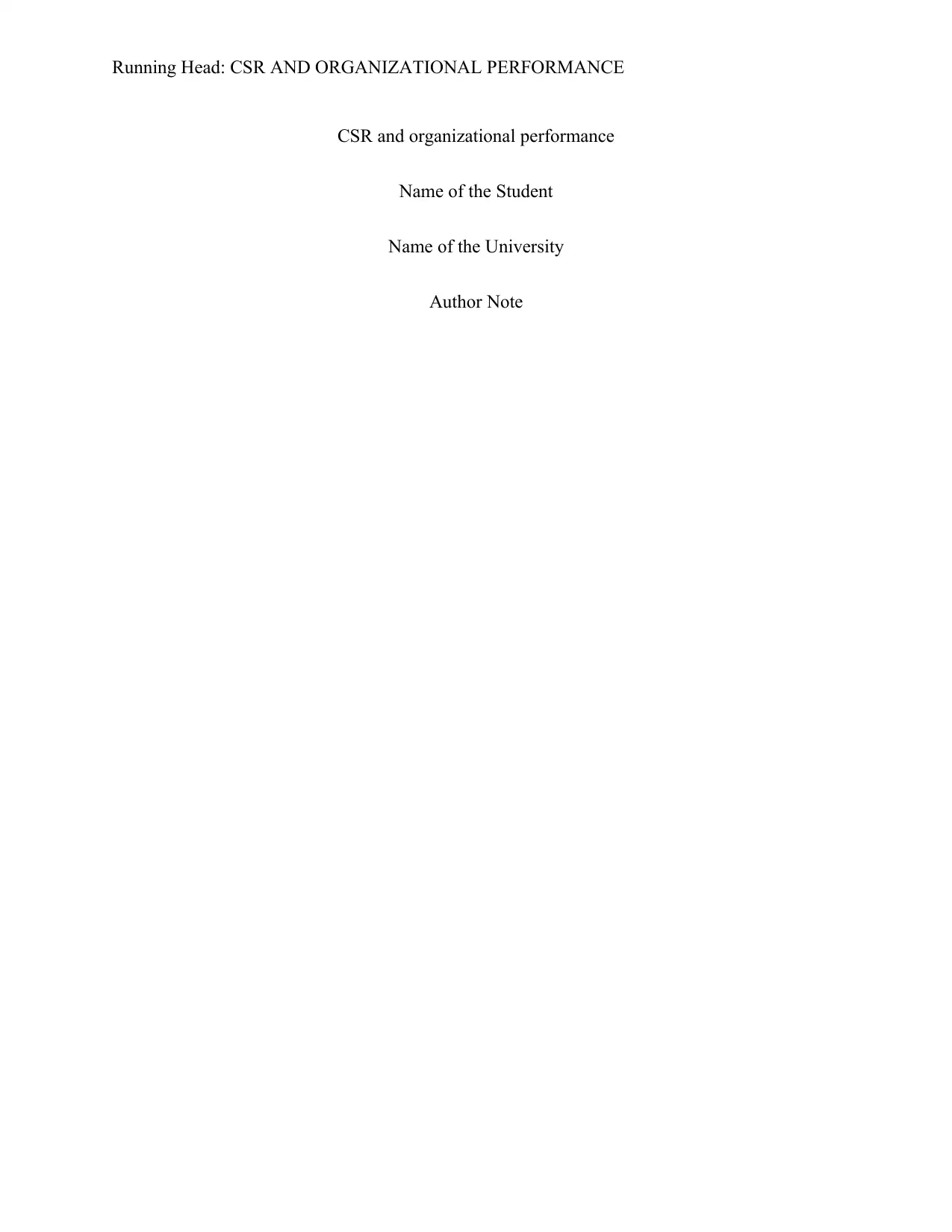
Running Head: CSR AND ORGANIZATIONAL PERFORMANCE
CSR and organizational performance
Name of the Student
Name of the University
Author Note
CSR and organizational performance
Name of the Student
Name of the University
Author Note
Paraphrase This Document
Need a fresh take? Get an instant paraphrase of this document with our AI Paraphraser
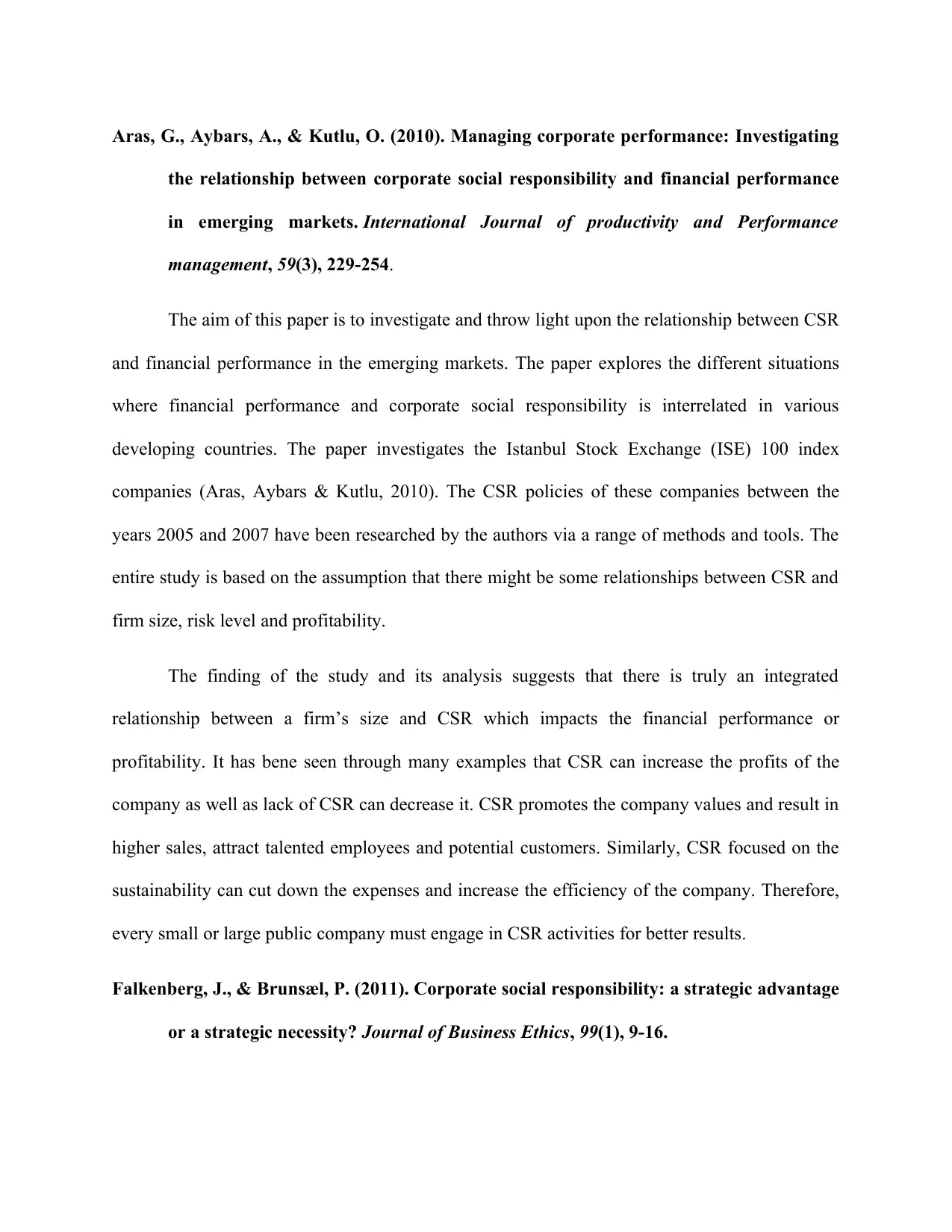
Aras, G., Aybars, A., & Kutlu, O. (2010). Managing corporate performance: Investigating
the relationship between corporate social responsibility and financial performance
in emerging markets. International Journal of productivity and Performance
management, 59(3), 229-254.
The aim of this paper is to investigate and throw light upon the relationship between CSR
and financial performance in the emerging markets. The paper explores the different situations
where financial performance and corporate social responsibility is interrelated in various
developing countries. The paper investigates the Istanbul Stock Exchange (ISE) 100 index
companies (Aras, Aybars & Kutlu, 2010). The CSR policies of these companies between the
years 2005 and 2007 have been researched by the authors via a range of methods and tools. The
entire study is based on the assumption that there might be some relationships between CSR and
firm size, risk level and profitability.
The finding of the study and its analysis suggests that there is truly an integrated
relationship between a firm’s size and CSR which impacts the financial performance or
profitability. It has bene seen through many examples that CSR can increase the profits of the
company as well as lack of CSR can decrease it. CSR promotes the company values and result in
higher sales, attract talented employees and potential customers. Similarly, CSR focused on the
sustainability can cut down the expenses and increase the efficiency of the company. Therefore,
every small or large public company must engage in CSR activities for better results.
Falkenberg, J., & Brunsæl, P. (2011). Corporate social responsibility: a strategic advantage
or a strategic necessity? Journal of Business Ethics, 99(1), 9-16.
the relationship between corporate social responsibility and financial performance
in emerging markets. International Journal of productivity and Performance
management, 59(3), 229-254.
The aim of this paper is to investigate and throw light upon the relationship between CSR
and financial performance in the emerging markets. The paper explores the different situations
where financial performance and corporate social responsibility is interrelated in various
developing countries. The paper investigates the Istanbul Stock Exchange (ISE) 100 index
companies (Aras, Aybars & Kutlu, 2010). The CSR policies of these companies between the
years 2005 and 2007 have been researched by the authors via a range of methods and tools. The
entire study is based on the assumption that there might be some relationships between CSR and
firm size, risk level and profitability.
The finding of the study and its analysis suggests that there is truly an integrated
relationship between a firm’s size and CSR which impacts the financial performance or
profitability. It has bene seen through many examples that CSR can increase the profits of the
company as well as lack of CSR can decrease it. CSR promotes the company values and result in
higher sales, attract talented employees and potential customers. Similarly, CSR focused on the
sustainability can cut down the expenses and increase the efficiency of the company. Therefore,
every small or large public company must engage in CSR activities for better results.
Falkenberg, J., & Brunsæl, P. (2011). Corporate social responsibility: a strategic advantage
or a strategic necessity? Journal of Business Ethics, 99(1), 9-16.
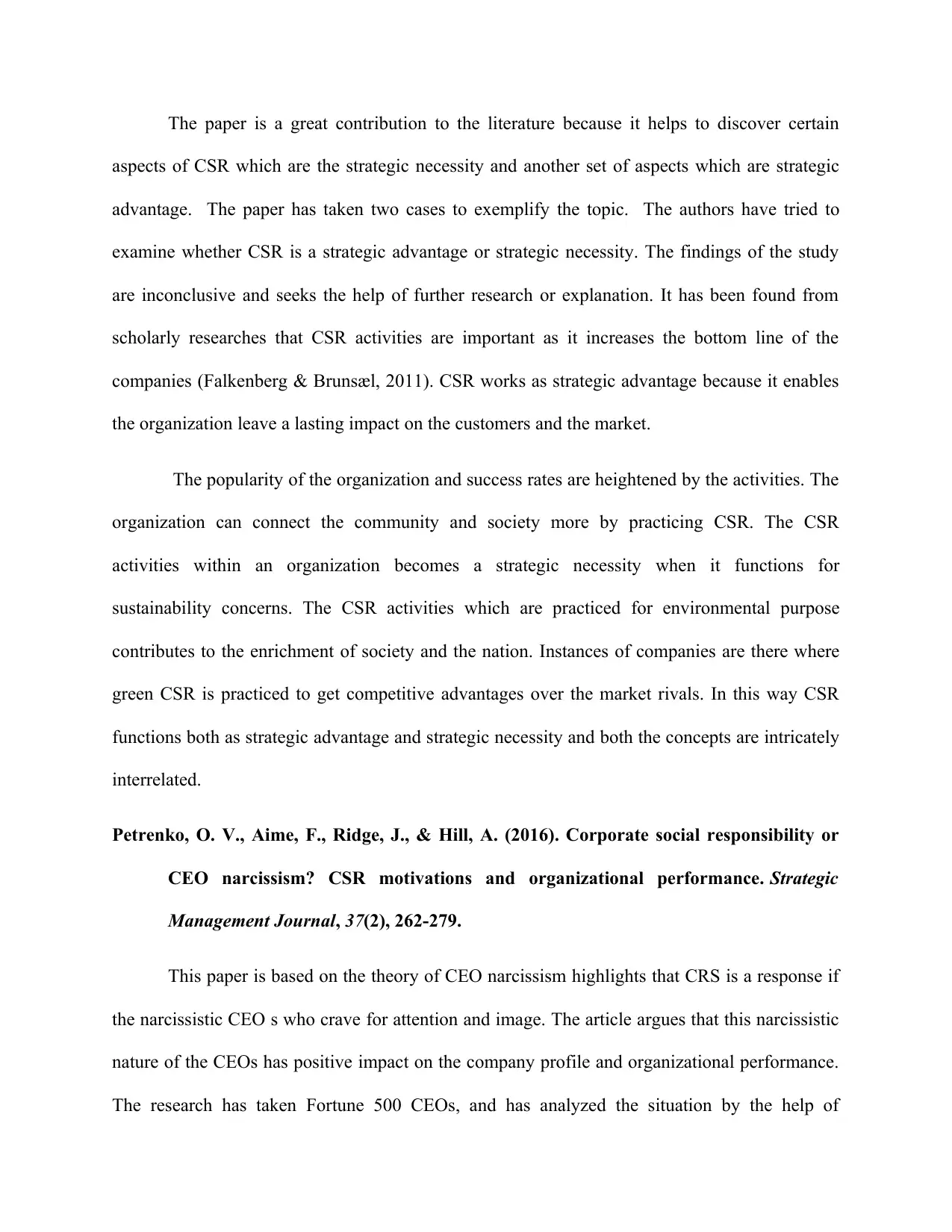
The paper is a great contribution to the literature because it helps to discover certain
aspects of CSR which are the strategic necessity and another set of aspects which are strategic
advantage. The paper has taken two cases to exemplify the topic. The authors have tried to
examine whether CSR is a strategic advantage or strategic necessity. The findings of the study
are inconclusive and seeks the help of further research or explanation. It has been found from
scholarly researches that CSR activities are important as it increases the bottom line of the
companies (Falkenberg & Brunsæl, 2011). CSR works as strategic advantage because it enables
the organization leave a lasting impact on the customers and the market.
The popularity of the organization and success rates are heightened by the activities. The
organization can connect the community and society more by practicing CSR. The CSR
activities within an organization becomes a strategic necessity when it functions for
sustainability concerns. The CSR activities which are practiced for environmental purpose
contributes to the enrichment of society and the nation. Instances of companies are there where
green CSR is practiced to get competitive advantages over the market rivals. In this way CSR
functions both as strategic advantage and strategic necessity and both the concepts are intricately
interrelated.
Petrenko, O. V., Aime, F., Ridge, J., & Hill, A. (2016). Corporate social responsibility or
CEO narcissism? CSR motivations and organizational performance. Strategic
Management Journal, 37(2), 262-279.
This paper is based on the theory of CEO narcissism highlights that CRS is a response if
the narcissistic CEO s who crave for attention and image. The article argues that this narcissistic
nature of the CEOs has positive impact on the company profile and organizational performance.
The research has taken Fortune 500 CEOs, and has analyzed the situation by the help of
aspects of CSR which are the strategic necessity and another set of aspects which are strategic
advantage. The paper has taken two cases to exemplify the topic. The authors have tried to
examine whether CSR is a strategic advantage or strategic necessity. The findings of the study
are inconclusive and seeks the help of further research or explanation. It has been found from
scholarly researches that CSR activities are important as it increases the bottom line of the
companies (Falkenberg & Brunsæl, 2011). CSR works as strategic advantage because it enables
the organization leave a lasting impact on the customers and the market.
The popularity of the organization and success rates are heightened by the activities. The
organization can connect the community and society more by practicing CSR. The CSR
activities within an organization becomes a strategic necessity when it functions for
sustainability concerns. The CSR activities which are practiced for environmental purpose
contributes to the enrichment of society and the nation. Instances of companies are there where
green CSR is practiced to get competitive advantages over the market rivals. In this way CSR
functions both as strategic advantage and strategic necessity and both the concepts are intricately
interrelated.
Petrenko, O. V., Aime, F., Ridge, J., & Hill, A. (2016). Corporate social responsibility or
CEO narcissism? CSR motivations and organizational performance. Strategic
Management Journal, 37(2), 262-279.
This paper is based on the theory of CEO narcissism highlights that CRS is a response if
the narcissistic CEO s who crave for attention and image. The article argues that this narcissistic
nature of the CEOs has positive impact on the company profile and organizational performance.
The research has taken Fortune 500 CEOs, and has analyzed the situation by the help of
⊘ This is a preview!⊘
Do you want full access?
Subscribe today to unlock all pages.

Trusted by 1+ million students worldwide
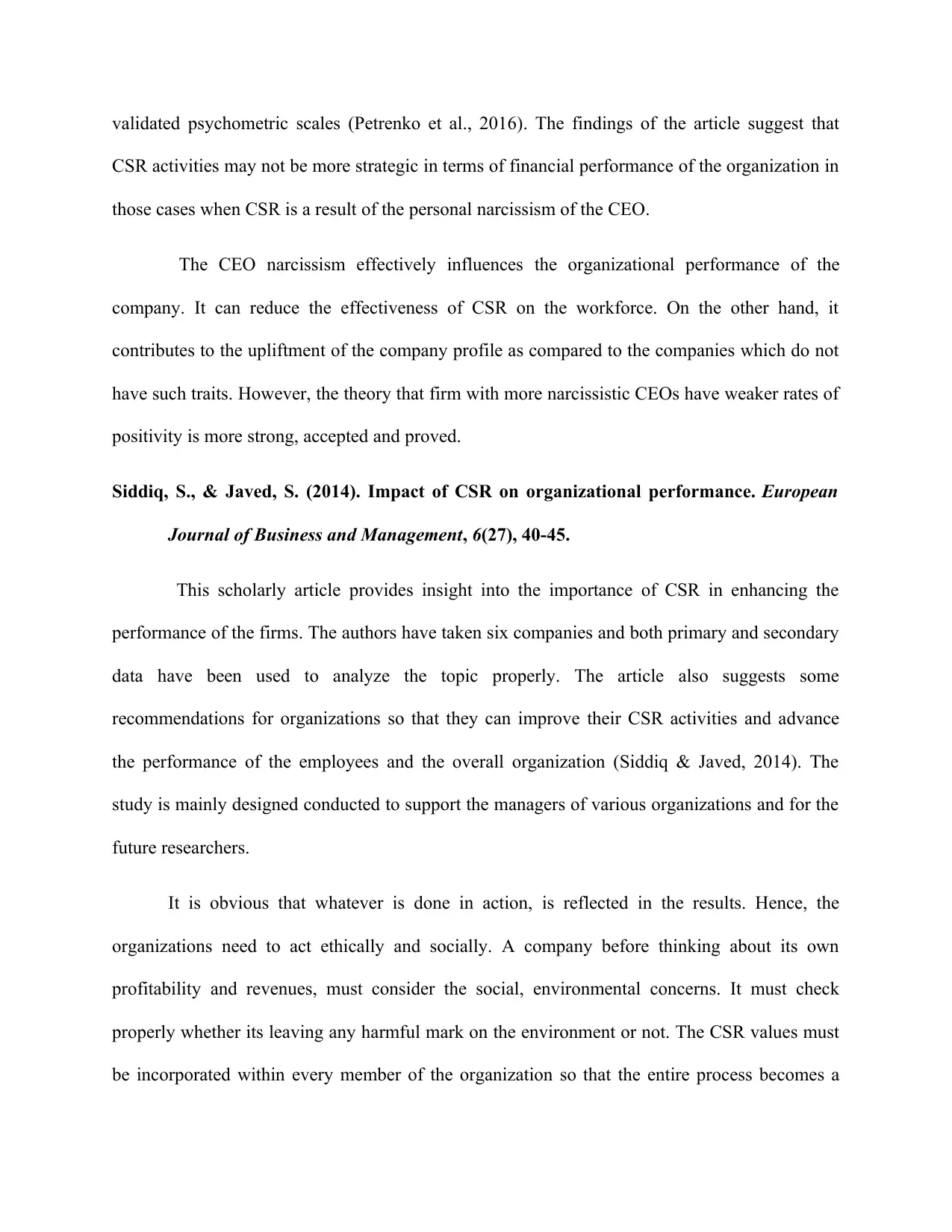
validated psychometric scales (Petrenko et al., 2016). The findings of the article suggest that
CSR activities may not be more strategic in terms of financial performance of the organization in
those cases when CSR is a result of the personal narcissism of the CEO.
The CEO narcissism effectively influences the organizational performance of the
company. It can reduce the effectiveness of CSR on the workforce. On the other hand, it
contributes to the upliftment of the company profile as compared to the companies which do not
have such traits. However, the theory that firm with more narcissistic CEOs have weaker rates of
positivity is more strong, accepted and proved.
Siddiq, S., & Javed, S. (2014). Impact of CSR on organizational performance. European
Journal of Business and Management, 6(27), 40-45.
This scholarly article provides insight into the importance of CSR in enhancing the
performance of the firms. The authors have taken six companies and both primary and secondary
data have been used to analyze the topic properly. The article also suggests some
recommendations for organizations so that they can improve their CSR activities and advance
the performance of the employees and the overall organization (Siddiq & Javed, 2014). The
study is mainly designed conducted to support the managers of various organizations and for the
future researchers.
It is obvious that whatever is done in action, is reflected in the results. Hence, the
organizations need to act ethically and socially. A company before thinking about its own
profitability and revenues, must consider the social, environmental concerns. It must check
properly whether its leaving any harmful mark on the environment or not. The CSR values must
be incorporated within every member of the organization so that the entire process becomes a
CSR activities may not be more strategic in terms of financial performance of the organization in
those cases when CSR is a result of the personal narcissism of the CEO.
The CEO narcissism effectively influences the organizational performance of the
company. It can reduce the effectiveness of CSR on the workforce. On the other hand, it
contributes to the upliftment of the company profile as compared to the companies which do not
have such traits. However, the theory that firm with more narcissistic CEOs have weaker rates of
positivity is more strong, accepted and proved.
Siddiq, S., & Javed, S. (2014). Impact of CSR on organizational performance. European
Journal of Business and Management, 6(27), 40-45.
This scholarly article provides insight into the importance of CSR in enhancing the
performance of the firms. The authors have taken six companies and both primary and secondary
data have been used to analyze the topic properly. The article also suggests some
recommendations for organizations so that they can improve their CSR activities and advance
the performance of the employees and the overall organization (Siddiq & Javed, 2014). The
study is mainly designed conducted to support the managers of various organizations and for the
future researchers.
It is obvious that whatever is done in action, is reflected in the results. Hence, the
organizations need to act ethically and socially. A company before thinking about its own
profitability and revenues, must consider the social, environmental concerns. It must check
properly whether its leaving any harmful mark on the environment or not. The CSR values must
be incorporated within every member of the organization so that the entire process becomes a
Paraphrase This Document
Need a fresh take? Get an instant paraphrase of this document with our AI Paraphraser
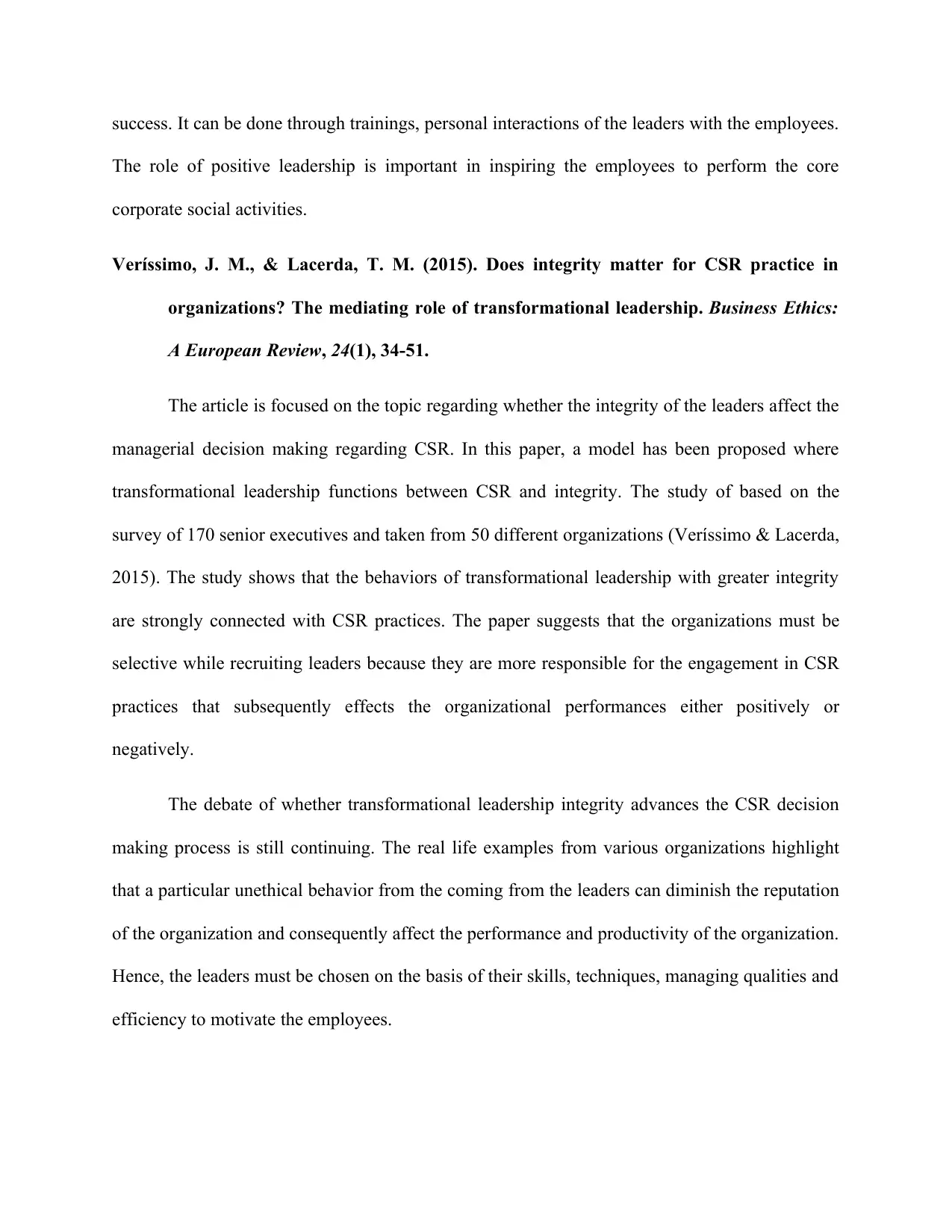
success. It can be done through trainings, personal interactions of the leaders with the employees.
The role of positive leadership is important in inspiring the employees to perform the core
corporate social activities.
Veríssimo, J. M., & Lacerda, T. M. (2015). Does integrity matter for CSR practice in
organizations? The mediating role of transformational leadership. Business Ethics:
A European Review, 24(1), 34-51.
The article is focused on the topic regarding whether the integrity of the leaders affect the
managerial decision making regarding CSR. In this paper, a model has been proposed where
transformational leadership functions between CSR and integrity. The study of based on the
survey of 170 senior executives and taken from 50 different organizations (Veríssimo & Lacerda,
2015). The study shows that the behaviors of transformational leadership with greater integrity
are strongly connected with CSR practices. The paper suggests that the organizations must be
selective while recruiting leaders because they are more responsible for the engagement in CSR
practices that subsequently effects the organizational performances either positively or
negatively.
The debate of whether transformational leadership integrity advances the CSR decision
making process is still continuing. The real life examples from various organizations highlight
that a particular unethical behavior from the coming from the leaders can diminish the reputation
of the organization and consequently affect the performance and productivity of the organization.
Hence, the leaders must be chosen on the basis of their skills, techniques, managing qualities and
efficiency to motivate the employees.
The role of positive leadership is important in inspiring the employees to perform the core
corporate social activities.
Veríssimo, J. M., & Lacerda, T. M. (2015). Does integrity matter for CSR practice in
organizations? The mediating role of transformational leadership. Business Ethics:
A European Review, 24(1), 34-51.
The article is focused on the topic regarding whether the integrity of the leaders affect the
managerial decision making regarding CSR. In this paper, a model has been proposed where
transformational leadership functions between CSR and integrity. The study of based on the
survey of 170 senior executives and taken from 50 different organizations (Veríssimo & Lacerda,
2015). The study shows that the behaviors of transformational leadership with greater integrity
are strongly connected with CSR practices. The paper suggests that the organizations must be
selective while recruiting leaders because they are more responsible for the engagement in CSR
practices that subsequently effects the organizational performances either positively or
negatively.
The debate of whether transformational leadership integrity advances the CSR decision
making process is still continuing. The real life examples from various organizations highlight
that a particular unethical behavior from the coming from the leaders can diminish the reputation
of the organization and consequently affect the performance and productivity of the organization.
Hence, the leaders must be chosen on the basis of their skills, techniques, managing qualities and
efficiency to motivate the employees.
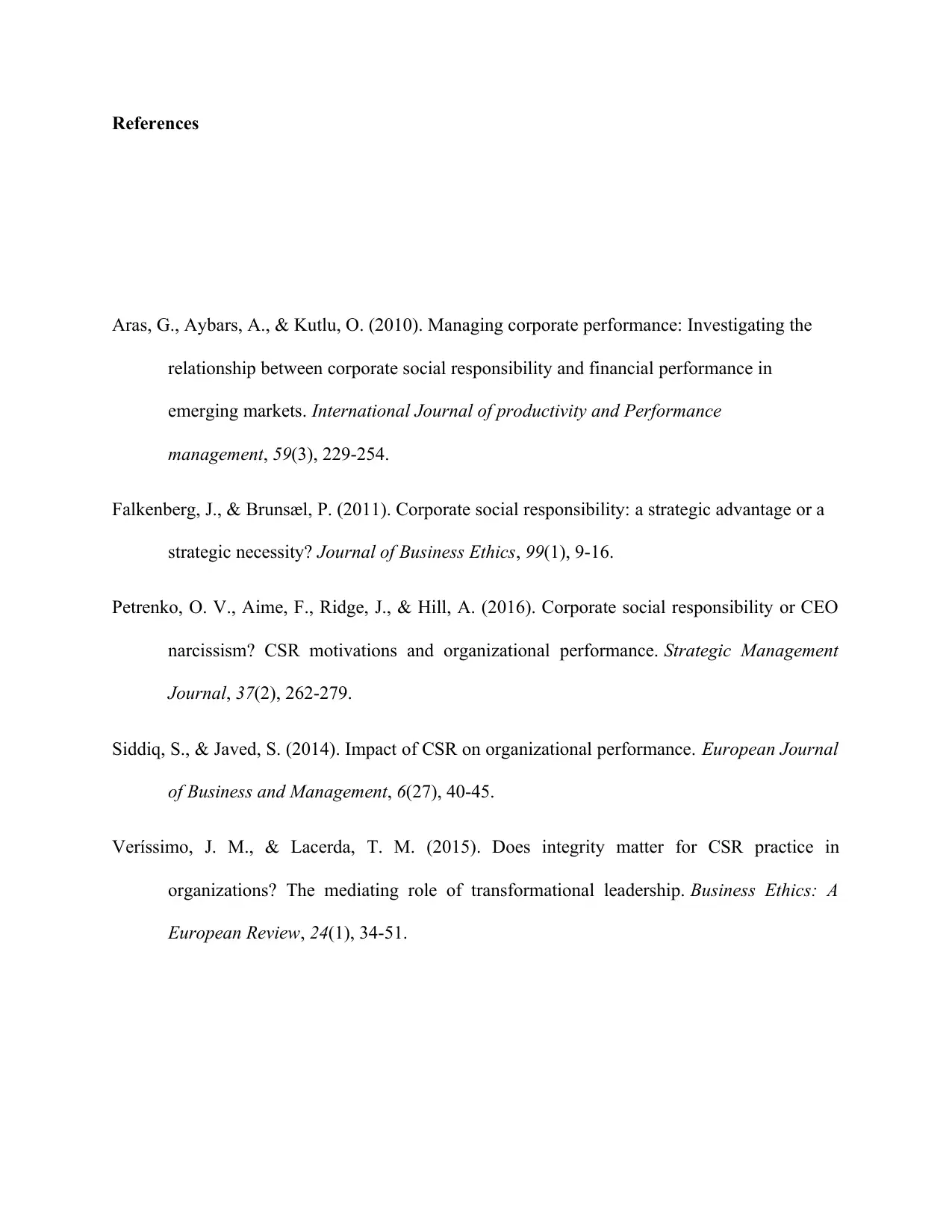
References
Aras, G., Aybars, A., & Kutlu, O. (2010). Managing corporate performance: Investigating the
relationship between corporate social responsibility and financial performance in
emerging markets. International Journal of productivity and Performance
management, 59(3), 229-254.
Falkenberg, J., & Brunsæl, P. (2011). Corporate social responsibility: a strategic advantage or a
strategic necessity? Journal of Business Ethics, 99(1), 9-16.
Petrenko, O. V., Aime, F., Ridge, J., & Hill, A. (2016). Corporate social responsibility or CEO
narcissism? CSR motivations and organizational performance. Strategic Management
Journal, 37(2), 262-279.
Siddiq, S., & Javed, S. (2014). Impact of CSR on organizational performance. European Journal
of Business and Management, 6(27), 40-45.
Veríssimo, J. M., & Lacerda, T. M. (2015). Does integrity matter for CSR practice in
organizations? The mediating role of transformational leadership. Business Ethics: A
European Review, 24(1), 34-51.
Aras, G., Aybars, A., & Kutlu, O. (2010). Managing corporate performance: Investigating the
relationship between corporate social responsibility and financial performance in
emerging markets. International Journal of productivity and Performance
management, 59(3), 229-254.
Falkenberg, J., & Brunsæl, P. (2011). Corporate social responsibility: a strategic advantage or a
strategic necessity? Journal of Business Ethics, 99(1), 9-16.
Petrenko, O. V., Aime, F., Ridge, J., & Hill, A. (2016). Corporate social responsibility or CEO
narcissism? CSR motivations and organizational performance. Strategic Management
Journal, 37(2), 262-279.
Siddiq, S., & Javed, S. (2014). Impact of CSR on organizational performance. European Journal
of Business and Management, 6(27), 40-45.
Veríssimo, J. M., & Lacerda, T. M. (2015). Does integrity matter for CSR practice in
organizations? The mediating role of transformational leadership. Business Ethics: A
European Review, 24(1), 34-51.
⊘ This is a preview!⊘
Do you want full access?
Subscribe today to unlock all pages.

Trusted by 1+ million students worldwide
1 out of 6
Related Documents
Your All-in-One AI-Powered Toolkit for Academic Success.
+13062052269
info@desklib.com
Available 24*7 on WhatsApp / Email
![[object Object]](/_next/static/media/star-bottom.7253800d.svg)
Unlock your academic potential
Copyright © 2020–2026 A2Z Services. All Rights Reserved. Developed and managed by ZUCOL.




